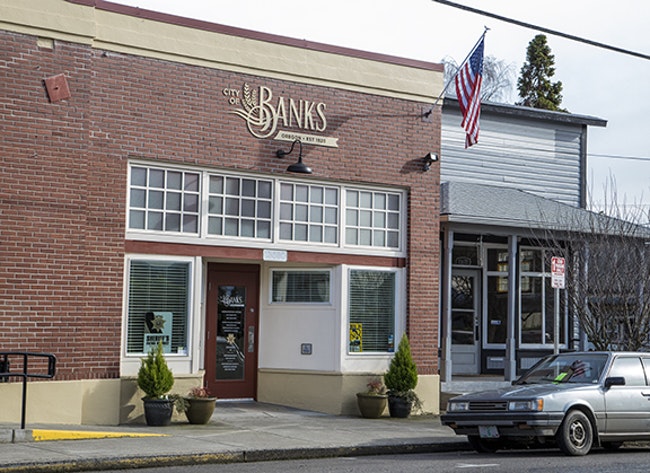The city of Banks, the Banks Fire District, the Banks School District, and private industry in town have come together to create an emergency preparedness plan for the city.
When there is a natural disaster or another event that affects all of the Banks community and its residents there is a plan in place to coordinate efforts between the city’s three public agencies and private industry so that citizens can receive the help they may need and all of the processes within the city can continue to operate.
The city hired Seattle-based Gleaves Consulting, a company that helps municipalities develop emergency preparedness plans, and company founder Kathy Gleaves worked with the city, Banks fire, and the school district, holding what is known as “table-top” discussions, where each entity shared the plans they already have developed.
The groups worked to coordinate these plans and how they would enact them in the event of a natural disaster or another emergency, and also worked with private companies in Banks to develop a master plan to coordinate all of these efforts so that they would not be operating individually or without being able to communicate with one another.
It’s typical for large cities with more financial reserves to develop such detailed emergency response plans, but it is not common for cities with populations and budgets the size of Banks to do so, Gleaves said.
“I have great admiration for the city deciding to make taking care of the town and its people a priority,” she said. “Banks is small and recognized it has limited resources and that all of its agencies are going to have to work together for the greater good of the community (in the event of a city-wide emergency).
Sometimes within cities, the different public agencies think they’re independent and they can manage everything on their own. Many small towns recognize they can’t, and many others don’t recognize that, and Banks wanted a plan to help them be able to do that in an emergency, Gleaves said.
Details of the plan
In instances where an incident occurs within the city limits and involves all parts of the Banks community, the city of Banks, the school district, and the fire department will come together to establish an emergency operations center (EOC). A representative from each agency will go to the EOC and become part of an official incident management team. Each representative will have the authority to act on behalf of their agency, making up a unified command, but no one agency can dictate another agency’s actions.
Help from the county and private entities in Banks may be called in depending on the severity of the circumstances. Jim’s Thriftway has agreed to help with food distribution if needed, and since there are no longer are medical services or a pharmacy in town Banks Veterinary Service has agreed, if the town should become isolated during a major disaster, to provide lab services and X-rays, and distribute what medication it can, for human patients in a medical emergency.
City Manager Jolynn Becker also has been working to obtain memos of understanding from private companies in town that may have the resources the city needs during an emergency.
For instance, in the event of an emergency, there may not be enough time for the Banks City Council to formally approve spending measures but some local businesses could quickly access financial or other resources to assist the city so it can quickly purchase or get what it needs and then the council later can formally approve the spending and the city will pay back what was given.
“These memos of understanding are a great way for the city to have a list of resources available and emergency contact numbers of who to call and to know who has agreed to pay upfront for anything the city might need,” Gleaves said.
The city is not required to use any particular company, and none of them are required to supply anything to the city; it’s just a list of what is available and who has it.
There also has been a business continuity plan developed for the vet clinic to help it recover and get back the supplies they provide during the overall effort, Gleaves said.
In addition to these plans, a debris management plan has been developed — clearing debris can be the most costly, time- and manpower-consuming aspect of a natural disaster, Becker said.
Finally, the table-top discussions also revealed that neither the Banks School District nor Banks Fire had a way of communicating with school buses making routes. Since then, the school bus company has installed radios on all of its buses.
Another table-top meeting is scheduled for June 14 so all of these operations and solutions can be tested, and to see if anything might have been overlooked so gaps in the process can be patched, Becker said.
Banks Fire also planned to present its individual plan to the Fire District Board on June 8 and it will be available for the public to review the following day, Fire Chief Rodney Linz said.
“Most cities have emergency operations plans,” Linz said. “What we did in Banks is unique (in Washington County). We made a working document between all three entities in the city, and also brought in partners (in private entities) to work together to benefit the community so instead of each agency having an individual plan the others aren’t aware of we have one plan to address all of our needs.”
Becker said the city plans to have Tualatin Valley Community Television create a video explaining how the Banks emergency preparedness plan works for residents to view on television and on social media that also will include tips on how people can prepare for an emergency.
Becker also said there is some extra funding left over from the grant the city received that allowed it to hold the table-top exercises and create this plan, and that she is looking into getting approval to use it to purchase a community trailer that would be housed at the fire department or city hall that will contain cots and sleeping bags and other miscellaneous items to have available if those types of supplies are needed during an emergency.
“(The grant requires us to) have this done by September 30 and we have a short window to do that with school not in session during most of July and part of August,” Becker said.
The Gleaves Consulting report is available to view in the May 10 city council meeting agenda packet on the city of Banks’ website at https://www.cityofbanks.org/councilpackets.






